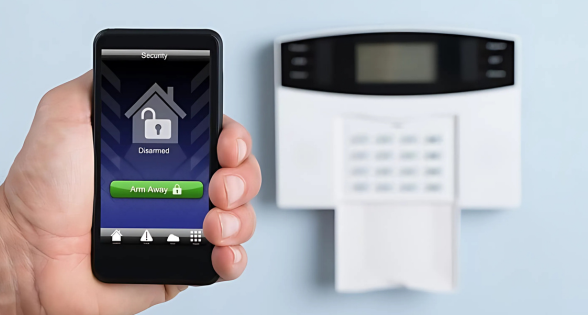As home security improves, alarm monitoring systems have become essential for keeping what matters most safe. With today’s technology, having a security system that alerts you and emergency services during emergencies is crucial. These monitored systems provide 24/7 alarm monitoring and peace of mind, letting you know help is just a signal away. In this guide, we’ll cover everything you need to know about alarm monitoring and how to choose the best system for your home.
What is Alarm Monitoring?
Alarm Monitoring is a service that keeps an eye on your home’s security system 24/7. When the alarm detects a problem, like unauthorized entry or fire, it instantly sends an alert to a monitoring center. From there, trained staff assess the alert and notify you and emergency responders if needed. This means that, whether you’re at home or away, your security setup stays on guard, providing a fast response to any threats.
How Does a Monitored Alarm System Work?
A monitored system relies on several key components:
- Sensors and Detectors: These devices monitor for unusual activity, such as motion, door opening, or broken windows.
- Control Panel: The control panel is like the brain of the setup, connecting sensors to the Alarm Monitoring center.
- Monitoring Station: Staff at the station watch for alerts and act on them as needed, day or night.
When an alarm goes off, a signal is sent to the monitoring center within seconds. The team quickly checks the alert and contacts the right authorities to respond. This process is fast and ensures that help is dispatched immediately when there’s an emergency.
Benefits of a Monitored Security System for Home Security
A monitored setup offers several key benefits:
- Immediate Response: Rapid response times help prevent damage or theft.
- Peace of Mind: Knowing your home is watched over 24/7 lets you relax, even when you’re not around.
- Deterrent to Burglars: Intruders are less likely to target a home with Alarm Monitoring.
- Lower Insurance Rates: Many insurance companies offer discounts for homes with a monitored setup since they’re safer.
These benefits show why many homeowners rely on Alarm Monitoring systems to enhance home security.
Types of Monitored Security Systems
There are different types of Alarm Monitoring systems to fit various needs and settings. Here are three common ones:
- Landline Monitoring: Uses a traditional phone line to send signals. It’s effective but can be disrupted if the phone line is cut.
- Cellular Monitoring: Sends alerts using mobile networks, making it more reliable because there are no wires to cut.
- Broadband Monitoring: Uses an internet connection, which is fast but only works if the internet is stable.
Each type has its strengths, and choosing the right one depends on your specific needs, location, and budget.
Choosing the Ideal Alarm Monitoring System for Your Home
When selecting a security setup, consider your location, budget, and lifestyle. For instance, if you live in a remote area, a cellular or broadband Alarm Monitoring system may be better than a landline option. Also, think about advanced features like mobile app control or video verification that might suit your lifestyle.
Top Features to Look for in a Monitored Security System
Modern monitored systems come with a variety of features. Here are some to consider:
- Mobile App Access: Control and monitor your system remotely via a smartphone app.
- Video Surveillance: Some systems include cameras, allowing you to see what’s happening at home.
- Two-Way Audio: Communicate directly with the monitoring center or people on your property.
- Custom Alerts: Set alerts for specific times, locations, or types of activity.
These features make a monitored system not only more effective but also more convenient.
DIY vs. Professional Monitored Security
Nowadays, homeowners can choose between DIY and professional monitored systems:
- DIY Monitoring: You handle alerts and responses yourself. It’s often cheaper and easier to install but may lack the support of a professional service.
- Professional Monitoring: A team monitors your system 24/7 and can coordinate with emergency services. It offers greater reliability, ideal for families or people with high-value assets.
While DIY setups can save money, professional services offer a higher level of security and peace of mind.
Monitored System Costs and Considerations
The cost of these services varies, usually ranging from $20 to $50 per month based on the provider and features. Some companies offer lower rates with long-term contracts, but it’s essential to read the fine print. Also, keep in mind that there may be additional fees for equipment, installation, or early cancellation.
The Importance of Alarm Monitoring for Families
For families, a monitored Alarm Monitoring setup means having an extra layer of protection. Whether it’s knowing children are safe while you’re at work or protecting valuables when you’re away, a monitored setup offers reliable security. The constant oversight ensures that help is available if needed, giving reassurance to families with elderly members or young children.
Conclusion: Alarm Monitoring for Peace of Mind
An Alarm Monitoring system plays a vital role in home safety, providing protection when it matters most. It deters criminals, ensures fast responses, and gives homeowners peace of mind. By understanding the different types, benefits, and features, you can make an informed decision to keep your home and loved ones safe. Whether you go with DIY or professional Alarm Monitoring, investing in a quality setup is an investment in security and peace of mind that will pay off in the long run.
